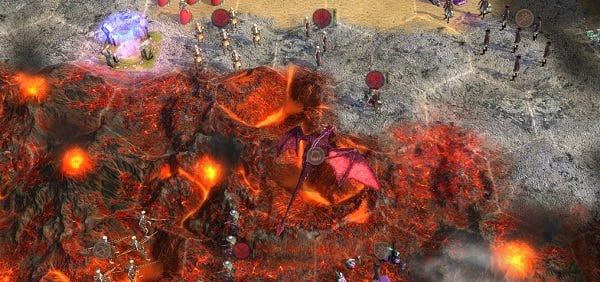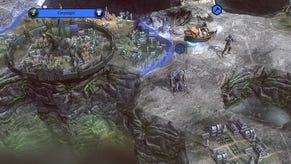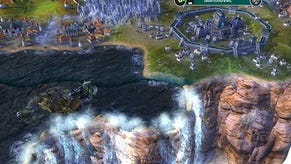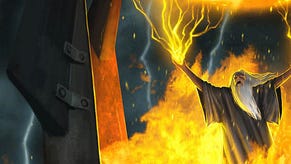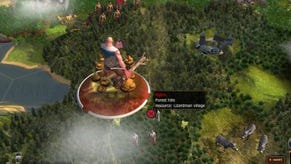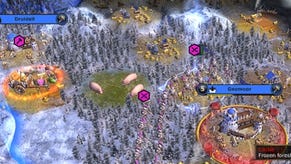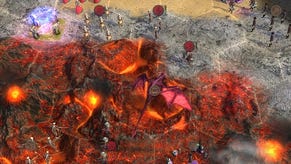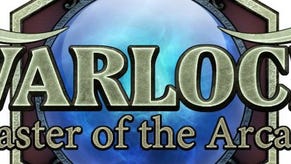Wot I Think: Warlock - Master Of The Arcane
Never Mind The Warlocks
Perhaps it was a mistake to send a jack of few trades to become a master of one, but strategic sorcery monsterbasher, Warlock: Master of the Arcane, has been in my sights for a good while now. After a great deal of conjuring and conquering, with very little in between, I have the flowing beard and haunted visage of a man who is accustomed to peeling back the fabric of reality and fashioning new life from the celestial clay that lurks beyond. I've also got a pretty good idea wot I think about this Warlocking business.
There’s a lot more wars than locks, that’s for certain. Rat nests, garbage piles, ancient ruins, spider holes – the countryside is littered with all sorts of lairs and labyrinths but none of them are ever locked, they’re just full of ‘orrible monsters that want to eat your face off. The natural solution is to summon some ‘orrible monsters of your own, point at the thing most resembling a face on whatever beasty is looming large and then have your forces bite it off.
It starts, as these things tend to do, with a single city floating in the darkness. Your first couple of military units will be the basic ranged and melee types for whichever of the three races your Great Mage is commander of. It’s a choice of undead, ratmen or menmen, and I tend to go for the ratmen. They have fast robber units but my appreciation of them is driven by more than utility. The best thing about ratmen is that they look like ratmen.
Off into the fog march your units, trotting across hexes of lava, snow, forest and field in their search for resources by which to build new cities, dungeons to loot and settlements to conquer. Meanwhile, your capital can steadily churn out new troops, limited only by the food, mana and gold it costs to support them. As the population grows, constructing new buildings will supply more of specific resources while also unlocking new unit types. It's a simple chain of commands that I like to call the Total War(lock) Machine.
Victory in combat provides experience and after a while your armies will grow stronger, or perhaps faster or more keen sighted. The choice is yours, up to a point, but the boosts are significant enough that certain squads can become treasured. And, hey, if you picked correctly they’re humanoid rats dressed as pirates so you should be treasuring them anyway.
Combat takes place on the very same hexes where everything else also takes place, with units unable to share a space. There’s no zooming into a tactical grid here. It’s a good decision as it means the map provides a snapshot of every military possibility, rather than requiring clicking and sorting through stacks. Archers line up behind melee units, firing over their heads, while impassable mountains become hugely important, either as buffers, choking points or the wall against which an army is pinned.
Being a Great Mage allows you to cast all manner of spells, although you’ll often feel like a Middling Mage when you find yourself ready for Horlicks and bed after lobbing a single fireball in the early afternoon. Spells cost mana and the more impressive they are, the longer they take to cast. Try to summon a greater elemental being and you might be waving your arms about and chanting for a good few turns but if you just want to enchant a few scimitars for your ratpeople, SHAZAM, it’s done in a flash.
New spells are researched and although I’m never entirely clear which route I’m taking through the arcane abilities available, there is apparently some influence exerted by whatever gods feel favourable toward your budding civilisation.
Aha! There’s the word I’d managed to avoid until now. ‘Civilisation’. Warlock looks a lot like Civilisation V and it plays a bit like all of them, as the previous paragraphs have hopefully made clear. Magic takes the place of science, pumpkin patches take the place of bananas and firestorms take the place of nuclear strikes. Put that to one side though because it’s where the comparisons break apart like a ship in a kraken's grip that Warlock becomes a more interesting proposition than Civ with goblins.
Take the analogy of magic to science. It’s idiotically imperfect and I should never have used it, so sorry about that. More embarrassing still, I’ve almost certainly used it when talking about the game in the past without immediately retracting the idea as I’m doing now. The difference is obvious in terms of both magic’s place in the Warlock’s world and its application throughout the game.
Spells are, quite simply, methods to bolster your own armies by summoning creatures or boosting those you already have, or to devastate your enemies. Unlike Civ’s technology, magic in Warlock doesn't provide a basis for societal advancement or cultural discovery. You’re not going to summon the Sistine Chapel into being, you’re going to summon a cist-covered shadowspawn that eats chapels for breakfast. This isn’t a game that takes place over several thousand years, it’s more like a drawn-out military campaign set against a somewhat apocalyptic background.
It’s a war of wizards, not a tale of long-term development, growth and change. From the first turn, your objective isn’t to define the characteristics of your people through your choices, it’s to protect them from roaming monsters, aggressive neighbours and the attentions of the other Great Mages. Diplomacy tells you everything you need to know about the true focus of Warlock; there’s no delicacy to it, and it essentially boils down to threats, demands and declarations of war.
At the beginning of every turn, prompts gather at the right side of the screen, informing you of units and cities awaiting instructions. Perhaps you have six units awaiting directions, a city which has just grown and can therefore construct a new building, or a research project completed, meaning your next spell must be selected. Click through the list, address each item and you’ll have done everything that needs to be done. It’s an efficient and effective tool. However, it also becomes clear that beyond those prompts, there’s little else that can be done on each turn. Sure, you could build a few extra units, which you should be doing whenever you have any sort of surplus, but there are no sliders to adjust, workers to reassign or stats to absorb.
Cities are essentially little more than factories, producing resources which have the sole purpose of supporting the armies that the cities also assemble themselves. Despite that, the placement of buildings on the actual hexes around a settlement, as well as the variety of resources that can be exploited, does lend a degree of character to each place. I was also perhaps overly entertained when I built a coastal city, within viewing distance of a giant, thrashing sea serpent, and the game’s suggested name was Serpent Gate. Chance or design? A goblin city by the mountains was also called Giblincliff, which made me hope there was some element of control being exerted.
All of this warmongering certainly makes Warlock a more limited game than many people may have expected. There’s very little build-up and once the killing starts, there won’t be any lulls until the end of the campaign, unless the map generator somehow plants you in a quiet part of the world. In my experience there are no quiet parts in the worlds it weaves together, nor in the other worlds that sit alongside them.
As in Master of Magic, there are other planes to visit, through portals, although rather than just one alternate dimension, Warlock allows you to choose how many you want. It means there’s more to conquer and that’s pretty much all it means in terms of strategy, but venturing into the unknown does carry a certain thrill and the ‘X’ of eXploration is my favourite part of the game.
Starting a new game and seeing that your city is surrounded by volcanoes is fun. Finding that the lava fields behind those volcanoes are full of predator spiders is intimidating and a little skincrawly. Discovering neutral castles protected by skeleton archers in the forests on the far side of the lava is pleasing, as skeletons crumble under your arcane assaults. Having your unprotected capital conquered by a marauding band of bears, who I can only assume immediately elect a bear mayor, is utterly priceless.
And bears will swat you down at some point. Everything will. It’s a harsh truth of this seemingly light-hearted fantasy realm; your unprotected rear is a target for all manner of monsters. That’s partly due to the sheer quantity of wandering beasties, but it’s fair to say that the AI has consistently impressed me as well – not by flanking, counterattacking and luring me into traps, but by behaving competently and causing me no end of problems. It probably helps matters that the entire structure of the game is so geared toward constant aggression that the occasional half-hearted and misguided assault goes unnoticed among the barrage of offensive thrusts from every side.
Warlock is a game in which wizards throw armies and spells at one another, while attempting to tame a wild and hostile world. Despite that, it rarely feels as if epic tales are emerging, perhaps because the speed of the game, with the starting pistol of the arcane arms race sounding on the very first turn, is surprisingly intense considering the breathing space between turns.
I suspect it won’t be complex or varied enough for some, with a wholly aggressive approach the only option and a familiar rhythm to most campaigns, despite the impressive nature of the worlds it throws together. For me, however, it’s a success, with an impressive range of creatures and spells to discover, and a sense of wonder in the initial stages of discovering every new continent and archipelago.
In the end, its single-minded focus on conflict is a strength, provided it isn't too much of a barrier for your personal enjoyment, allowing for a streamlined and strangely effortless game of conquering and conjuring. It’s a shame that you’ll most likely knit your brow over the lack of documentation rather than tough strategic choices, unsure as to whether a site is suitable for settling because it’s unclear how useful the terrain is, but as a relatively short and concentrated dose of strategy in a light-hearted and colourful world, it’s something I see myself returning to frequently. It doesn't do a thousand things, as so many strategy games attempt to, but the few things that it does tackle, it mostly gets spot on.
All those words and I didn’t mention I only mentioned Master of Magic once.
Warlock: Master of the Arcane is available now for £14.99, or you could try the demo first and see if all this spellbiffery is to your liking.
